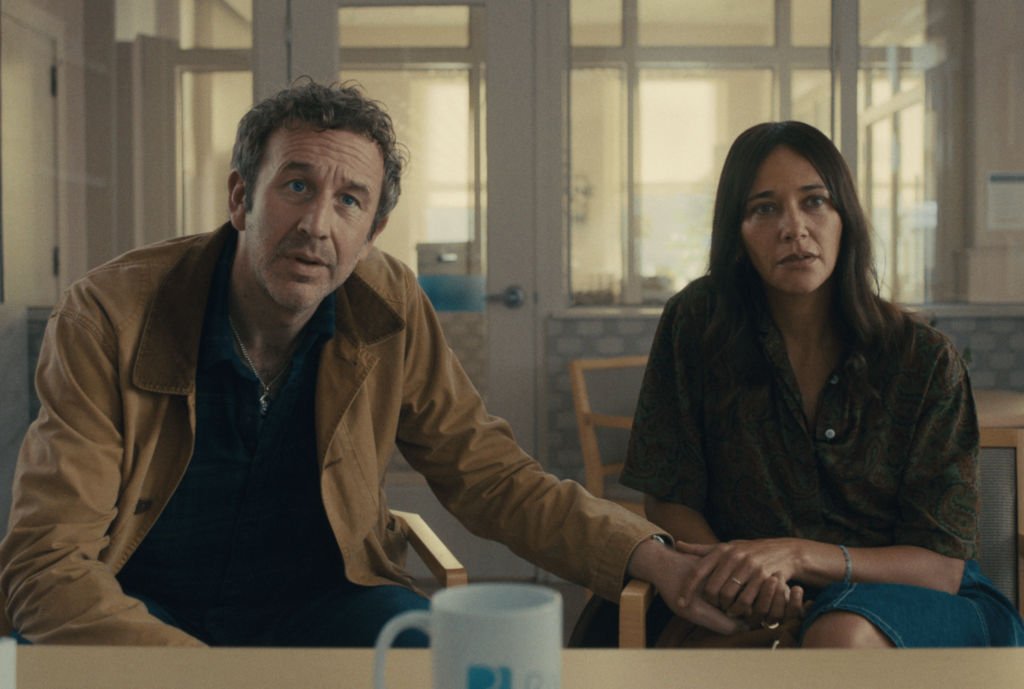Black Mirror started out as a grim, dark, and nihilistic exploration of near-future tech. But with the tragic romance of “San Junipero” in season 3, the anthology slowly started to shift its priorities. Early on, everything was bad: the technology and the people. And the former was used to show how awful the latter was, highlighting how its characters were largely stupid, greedy, and desperate. New technologies just brought out their worst tendencies. Steadily, though, the humans in the show have become more, well, human. Sure, some are stupid and evil, but many are just trying to do their best with the worst-case scenarios introduced by thoughtless tech advancements. The new season takes this philosophy even further — some episodes even have happy endings.
Perhaps the best example of this is the episode “Hotel Reverie.” When a golden age-era movie studio finds itself facing closure, it partners with a tech startup led by Kimmy (Awkwafina) that promises to remake its most famous film — Hotel Reverie — cheaply, quickly, and with the help of a Hollywood A-lister. After losing out on all of the Ryans (Gosling and Reynolds), the studio signs Brandy (Issa Rae), a perpetual cinematic sidekick dying to break out. Instead of just swapping her likeness for the original lead actor, though, the remake process is something more immersive; Brandy finds herself transported into the film and has to act through it in real time, surrounded by AI automatons that think they’re real people in this world.
Of course, things don’t go as planned. When it’s discovered that Brandy can’t play the piano, for instance, it completely changes a plot line, and the world’s characters react accordingly. Brandy and Kimmy’s team have to improvise to keep the narrative on track, like some kind of high-tech immersive theater. The important turn, though, is that Hotel Reverie’s other lead — Dorothy (Emma Corrin) — is exceedingly real to Brandy, and the two become very close, particularly during a forced hiatus from filming due to a technical hiccup. The episode becomes something like a cross between Her and a holodeck episode of Star Trek, but with the kind of tragic ending befitting Black Mirror.
Similarly, “Eulogy” is a bit like Black Mirror’s version of Eternal Sunshine of the Spotless Mind. When Phillip (Paul Giamatti) is asked to help put together an “immersive memorial” for a deceased ex-girlfriend, he ends up going through their past together in a way that forces him to confront the harsh realities of their relationship. The technology in this episode makes it possible to “enter” a photograph as a sort of VR experience, and Phillip, along with an AI companion (Patsy Ferran), searches for details and images of his ex that can be used at the funeral. Along the way, he’s able to understand important details he missed when he was younger, helped along by an AI that needles him about some questionable choices. Like “Hotel Reverie,” it ends on a bittersweet note.
What’s interesting about these episodes is how, like the depiction of love in a virtual world in “San Junipero,” they manage to cover Black Mirror’s mandate — to look at the worst-case scenario for plausible future tech — in a way that feels both dire and optimistic at the same time. Yes, the tech has a ruinous effect, but people are still able to fight through it and form real connections.
The same could be said of the darkly hilarious “Common People,” in which Amanda (Rashida Jones) has her life saved by a procedure that backs up her brain to the cloud. The surgery is free, but Amanda and her husband Mike (Chris O’Dowd) are then forced to deal with escalating subscription costs coupled with declining features. At one point, Amanda is almost fired from her teaching job because she can’t stop saying contextually appropriate ads since she’s stuck on the lower subscription tier. The episode is funny because of how frustratingly relatable it is, but it’s as much about the strains these escalating costs put on a relationship as it is about the technology itself.
The other change with this season of Black Mirror is that there’s more connective tissue with previous episodes. As in the past few seasons, there are little touches: the Netflix-like streaming service Streamberry makes a number of appearances, and multiple episodes use the same immersive tech in which users place a tiny circle on their temple in lieu of a headset. More notably, though, season 7 includes direct sequels to some of the show’s biggest hits. The choose-your-own-adventure episode “Bandersnatch” is followed by “Plaything,” in which genius coder Colin (Will Poulter) has crafted a Sims-like game that contains actual sentient digital life. Meanwhile, season 4’s “USS Callister” — in which another genius coder forced sentient digital clones of his coworkers to suffer for his amusement — continues with “Into Infinity,” where those clones are forced to fight and steal in order to survive in an MMO filled with players who want to kill them.
Both of these elements — the less abrasive storytelling and the recognition of past success — points to a maturation. Black Mirror isn’t the scrappy little guy anymore, it’s a major Netflix series packed with huge stars. That doesn’t mean its attacks on tech are any less poignant or funny, but many of the rough edges have been smoothed over to better connect to a larger audience. I wouldn’t say all of these stories have a happy ending, necessarily, but they’re pretty far removed from the disturbing conclusions of “The National Anthem” and “Shut Up and Dance.” And by focusing on characters you can really connect with, the tragic twists ultimately hit a lot harder.
Season 7 of Black Mirror is streaming on Netflix now.
Content shared from www.theverge.com.


